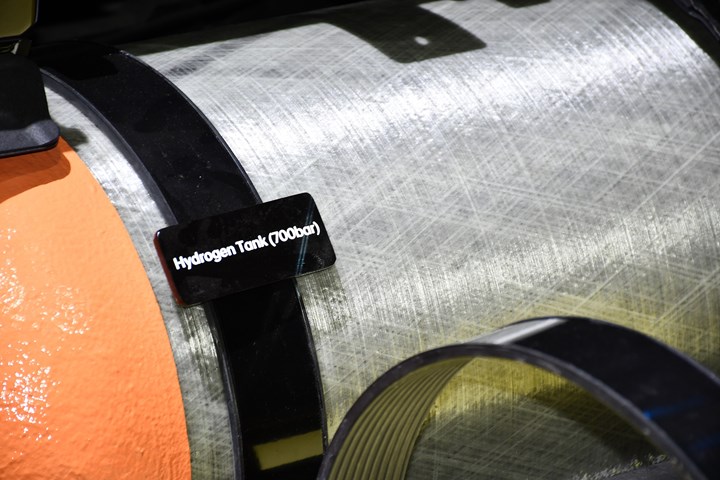Iljin Hysolus, Korea's leading composite tank producer for hydrogen storage, sets IPO for Sept. 3
Demand for hydrogen tanks is projected to support sustained growth, according to the company.

Iljin Hysolus composite tanks for Hyundai Nexo hydrogen fuel cell car. Photo Credit: Dr. Artur Braun, Wikimedia Commons.
South Korean hydrogen tank maker Iljin Hysolus Co. (Bongdong-eup) will be listed on the Korea Stock Exchange Index KOSPI on Sept. 3, according to the company’s online IPO briefing session on Aug. 19.
The company’s proposed price band for its IPO shares is between 25,700 and 34,300 won ($21.84-$29.14). The hydrogen tank maker will raise 280-374 billion won ($238-$317 million) depending on the final offering price, with its market capitalization between 933 billion won ($793 million) and 1.25 trillion won ($1 billion).
The newly raised funds will be used for the expansion of hydrogen fuel tank manufacturing facilities and R&D efforts. Analysts estimate that the number of shares available for trading immediately after the IPO on Sept. 3 will be 8,715,192 shares, or 24% of the total outstanding volume.
Established in 1999, Iljin Hysolus is the exclusive supplier of hydrogen tanks for the Hyundai (Seoul, South Korea) Nexo fuel cell car. It also supplies hydrogen tanks for Hyundai’s fuel cell police buses, wide-area buses and transit buses, and has recently received global accreditation for its Type IV hydrogen tube trailers. In June, the company also signed a deal with shipbuilder Samsung Heavy Industries (Seongnam-si, South Korea) to jointly develop hydrogen fuel cell-powered ships.
The demand for hydrogen tanks to be used by commercial vehicles and ships is on the rise, says Iljin Hysolus CEO, Hong-Sang Ahn. “The hydrogen tube trailer market is also expanding fast. We also expect that the air mobility industry will use more hydrogen tanks after 2025.”
The company’s revenue grew from $24 million in 2018 to $74 million in 2019 and increased again to $96 million in 2020. Securities industry projections expect Iljin Hysolus revenue to exceed $842 million by 2027 based on South Korea’s hydrogen road map. Announced in January 2019, the country aims to produce 6.2 million fuel cell electric vehicles and install at least 1,200 refilling stations by 2040. The plan also aims to have 2,000 hydrogen buses in operation by 2022 and 41,000 hydrogen buses by 2040.
Related Content
-
Composites end markets: Energy (2024)
Composites are used widely in oil/gas, wind and other renewable energy applications. Despite market challenges, growth potential and innovation for composites continue.
-
Composites end markets: Batteries and fuel cells (2024)
As the number of battery and fuel cell electric vehicles (EVs) grows, so do the opportunities for composites in battery enclosures and components for fuel cells.
-
Hexagon Purus opens new U.S. facility to manufacture composite hydrogen tanks
CW attends the opening of Westminster, Maryland, site and shares the company’s history, vision and leading role in H2 storage systems.














.jpg;maxWidth=300;quality=90)
